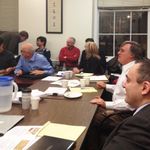Workshop on Oxford Handbook of Classical Chinese Literature, co-edited by Professor Wiebke Denecke
On December 4 and 5 2014 two dozen scholars from the US, Europe, Taiwan, and Vietnam convened at the East Asian Languages and Civilizations Department at Harvard to discuss their drafts for an Oxford Handbook of Classical Chinese Literature 1000 BCE-900 CE. The workshop was generously sponsored by the Boston University Center for the Study of Asia (BUCSA), as well as the Chiang Ching-Kuo Foundation, the Harvard Asia Center, the Harvard-Yenching Institute, and the Department of East Asian Languages and Civilizations at Harvard University.
The Handbook is co-edited by Wiebke Denecke (Boston University, Modern Languages and Comparative Literature and affiliated BUCSA faculty), Wai-yee Li (Harvard University, East Asian Languages and Civilizations), and Xiaofei Tian (Harvard University, East Asian Languages and Civilizations). It will compress essential knowledge and critical approaches to two thousand years of Chinese literary history between its book covers when published, as is currently planned, in 2016. Commissioned by Oxford University Press, this handbook is part of the Oxford Handbook Series that, in the words of the publisher, “advances an original conception of the field through a definitive collection of essays, each of which provides a survey of the current state of scholarly debate and an original argument about the future direction of research.”
The Oxford Handbook of Classical Chinese Literature is a first-of-its-kind handbook that integrates issue-oriented, thematic, topical and cross-cultural approaches to the classical Chinese literary heritage with historical perspectives. It introduces both literature and institutions of literary culture, in particular court culture and manuscript culture, which shaped early and medieval Chinese literary production. Problematizing the gap between traditional concepts and modern revisionary definitions of literary categories it fosters critical awareness of how this has shaped the transmission and reception of literature and literary history. It discusses both canonical works and works that fall between the cracks of modern disciplinary divisions of “philosophy,” “religion,” “history,” and “literature.” In a special section devoted to “China and the World,” the handbook explores issues of translation and cultural exchange on China’s periphery and explicitly expands the modern nation-based concept of “Classical Chinese Literature” to the Chinese-style literatures produced in Japan, Korea, and Vietnam. While recapturing the functioning of the East Asian “Sinographic sphere,” comprising cultures that traditionally relied on the Chinese script, it showcases the importance of Japan, Korea, and Vietnam for the study of Chinese literature. The lively discussions during the workshop were filled with both enthusiasm and anxiety over undertaking such a daunting project.
Ultimately, the Handbook also aims to enable a broader conversation between students of premodern literary cultures around the globe, from the Ancient Near East and Greco-Roman Antiquity, to the world of Arabic and Persian literatures, Europe, and India. Many contributors to the handbook and senior scholars on a concluding panel devoted to the future of the field agreed that as (Western) “Classics” and “Medieval Studies” are going “global,” Chinese literature scholars will want to join and shape that conversation, reach broader audiences, and spearhead a new kind of comparatism that brings philologists of the world’s classical literary traditions into a mutually beneficial dialogue that can be the basis for a more global and transcultural concept and practice of “Classical Studies.”
The workshop organizers, Professors Tian Xiaofei, Wai-yee Li (both Harvard),
and Wiebke Denecke (Boston University)
Workshop Participants

